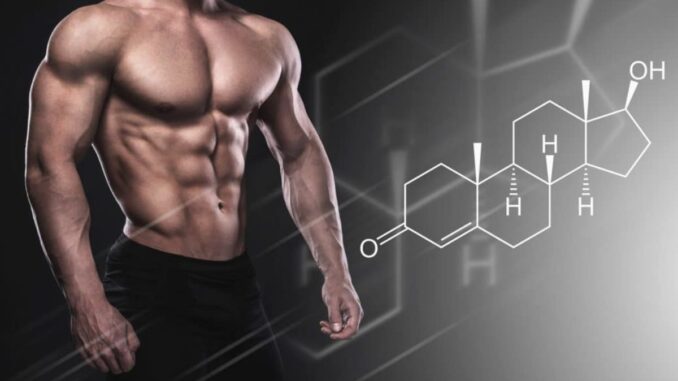
Testosterone is considered a male hormone. How a man looks and behaves has a lot to do with how much testosterone he has.
Growth of his facial and body hair, deepening of his voice, getting taller, stronger with bulking muscles – all depend on his levels of testosterone. During puberty, testosterone levels start to rise. Along with this, grows his sexual desire, pubic hair, sexual organs like the penis, and testes.
Evidently, your sex drive, sperm production, and fertility are connected to your testosterone levels. Testosterone plays a role in behaviors such as aggression, confidence, competitiveness, and self-esteem in men (1, 2). Testosterone impacts cognitive performance such as memory, impulsiveness, and decision making (3, 4)
So, it comes as no surprise that men with low testosterone also have decreased sex drives. A sudden lack of self-confidence and low self-esteem in a man may indicate falling testosterone levels. Lack of energy, difficulty in concentrating, and disturbed sleep patterns can result from low testosterone.
On the other hand, you’d think high testosterone means everything will be even better. But, too much of something is never a good idea. Oddly, symptoms of abnormally high testosterone include – shrinking of the testicles, low sperm count, and impotence! You can end up with acne, mood swings, impaired judgment, and uncharacteristically aggressive behavior (5) It’s best not to experiment with unregulated testosterone-boosting products in the market.
If you feel you have a testosterone deficiency, then it’s best to consult a doctor to diagnose and guide you in getting the right treatments.
Testosterone is called T or test, in short, by the “droid heads” (slang for men and women who abuse anabolic steroids).
Although it’s called a male sex hormone, women also need some amounts of testosterone for their optimum health. The imbalance of testosterone in women can lead to poor libido, acne, facial hair growth, hair loss, male pattern baldness, infertility, and more. Insulin resistance can cause testosterone to rise in women, leading to PCOD symptoms.
Isn’t it amazing just how powerful this hormone is – for both men and women? So, if you want to look good, feel great and be healthy, then you need to maintain optimum testosterone levels. You should learn everything you can about testosterone – what causes low testosterone? How can I check my T levels? What is the best low T treatment? Are there any natural remedies for low T? Read on and find out!
1. What Does Testosterone Do?
Let us take a quick look at the many roles of testosterone in men and women:
Role of Testosterone in Men
- Development of reproductive organs
- Development of male characteristics
- Fertility
- Regulates libido and erection
- Increases and strengthens muscle mass and strengthens muscles
- Maintains bone health
- Safeguards the cardiovascular system
- Improves pelvic floor and continence
- Improves mood
- Improves memory:
- Discourages obesity
Role of Testosterone in Women
- Enhancement of sex drive
- Maintenance of the female genitals
- Improves bone density
- Improves mood, reduces depression
- Improves muscle mass and strength
- Improves incontinence
Learn more about how testosterone is produced. Read in detail about the roles of testosterone in men and women.
2. The Causes of Low Testosterone
Low testosterone (hypogonadism) can be caused by many factors. It may be due to a malfunction in any of the glands involved in testosterone production.
Causes of Low Testosterone in Men
- Primary Hypogonadism: Low testosterone due to a problem with the testis.
- Secondary hypogonadism: Low testosterone caused by problems with the hypothalamus or the pituitary glands.
Other possible causes include:
- Excess estrogen levels: Too much estrogen in men can cause low T. Estrogen is produced from testosterone in men. The body down-regulates testosterone production to reduce estrogen synthesis.
- Medications such as opioids and steroids
- Inflammatory diseases such as sarcoidosis
- Pituitary tumor
- Extreme weight loss
Causes of Low Testosterone in Women
Causes of low T in women include:
- Oophorectomy: One or both ovaries are removed in this surgical procedure. Since ovaries produce testosterone in women, this leads to low T in females.
- Early menopause: After menopause, the ovaries stop producing testosterone, causing a significant drop in testosterone levels.
- Oral estrogen therapy: Estrogen supplementation can upset the balance of testosterone and estrogen.
Read in detail about the causes of low testosterone in men and women.
3. Signs and Symptoms of Low Testosterone
There are many signs and symptoms of low testosterone. During adolescence, inadequate amounts of testosterone in boys result in stunted growth and poor muscle development.
Signs and Symptoms of Low Testosterone in Men
Signs and symptoms of low testosterone in men include:
- Aging Appearance
- Abdominal Obesity
- Palpitation
- Decreased Muscle Mass
- Fatigue
- Joint Pain
- Night Sweats
- Constipation
- Mental And Behavioral Changes
Signs and Symptoms of Low Testosterone in Men
Signs and symptoms of low testosterone in females include:
- Muscle weakness
- Depression and lack of interest in life
- Unexplained tiredness and lethargy
- Low libido
- Weight gain
Read in detail about the signs and symptoms of low testosterone in men and women.
4. Diagnosis for Low Testosterone Levels
Your medical history and the symptoms you have been experiencing will help your doctor diagnose low T. To prescribe the right treatment plan, the doctors need to understand what is causing the low T. You may be asked to do the following tests for diagnosing your condition.
Blood Tests:
- Total testosterone
- Free testosterone
- SHBG
- FSH
- LH
- Prolactin
- Estrone (E1)
- Estradiol (E2)
- DHEA
- DHEA-S
- Androstenedione
- Androstanediol Glucuronide
- Dihydrotestosterone (DHT)
Urine tests:
- Free testosterone
- 17-Ketosteroids
- Androsterone
- Etiocholanolone
Other Investigations:
- Salivary free testosterone
- Imaging tests
Read more on all these tests and how they help diagnose the cause of low testosterone.
5: Downstream: The Long Term Effects of Low Testosterone
If not corrected, testosterone deficiency can lead to other health consequences, in both men and women. The side effects of untreated low T over the long term include:
Effects of Low T in Men
- Kyphosis
- Lordosis
- Dry eyes
- Gynecomastia
- Cellulite
- Varicose veins
- Hypotonic lax testicles -reduced size
- Erectile dysfunction
- Low sex drive
- Low sperm count
- Hair loss
- Loss of muscle mass
- Decreased bone mass
- Hot flashes
- Testicular atrophy
- Fatigue
- Lack of motivation
- Depression
Effects of Low T in Women
- Nervousness
- Lack of mental firmness
- Poor memory
- Pale dry eyes
- Cellulite
- Varicose veins
- Aging appearance
- Muscle laxity
- Day and night sweat outburst
- Vaginal atrophy, dryness, pruritis
- Low sex drive
- Decreased sexual satisfaction
- Weight gain
- Fatigue
- Muscle weakness
- Sluggishness
Read in detail about the consequences of long-term testosterone deficiency in men and women.
6: Medical Treatments for Low Testosterone
Low T is treatable. There are many treatment options available for correcting testosterone deficiency. Based on your symptoms and diagnosis, your doctor can advise you on the right course of treatment.
Testosterone Replacement Therapy (TRT)
Testosterone replacement therapy (TRT) is a popular treatment for correcting low levels of testosterone. TRT is administered in five different ways.
- Transdermal: Using topical gels, creams, liquids, and patches.
- Intramuscular: Short-acting and long-acting testosterone injections are available. They may be taken weekly or monthly.
- Oral/Buccal: The buccal dose comes as a patch to be kept between the gums and the inner lining of the mouth. The medication gets released slowly over a 12 hours period.
- Intranasal: This testosterone treatment is pumped/sprayed into each nostril, three times daily.
- Implants: Testosterone pellets are implanted inside the fatty tissues of the upper hip or buttocks. The pellets dissolve slowly and release their medication over a period of 3-6 months.
Low Testosterone Medications
- Testosterone products include patches, topical gels, nasal gels, and pellets as mentioned earlier. Testosterone gel and transdermal patches are the most popular among these
- Estrogen blockers suppress estrogen production. Excess estrogen can inhibit testosterone production. So reducing estrogen levels may help correct low T in such people.
- Aromatase inhibitors: Aromatase is an enzyme that converts testosterone to estrogen. Aromatase inhibitors help decrease estrogen in men with age-related or obesity-related low testosterone.
Testosterone therapy may have certain side effects.
Read more about various low T treatments and their side effects.
7: Natural Remedies for Boosting Low Testosterone Levels
Ayurvedic low T treatments use a variety of herbs to stimulate the production of testosterone. This includes:
- Tribulus Terrestris/ Puncturevine
- Horny Goat Weed/ Epimedium
- Tongkat Ali
- Ashwagandha
- Pine Bark extract
- Yohimbe bark
Diet plays a very important role. There are many lifestyle changes that boost your testosterone levels naturally.
Read more: Lifestyle Changes and Natural Remedies for Low Testosterone
